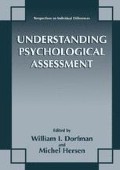Abstract
The purpose of this chapter is to discuss the use and interpretation of the Cognitive Assessment System. In writing this chapter I will encourage practitioners to take a technological step from traditional IQ tests to a modern approach to ability and its measurement. I view the CAS as a new technology that reflects advances made in psychology during the past 50 years and a tool that propels the field into the twenty-first century. The CAS is based on a strong theory and at the same time incorporates what has been learned in applied psychology and especially psychometrics. Most importantly, research presented in this chapter will show that the CAS is highly related to achievement, yields PASS profiles that are diagnostically important, and is relevant to intervention.
Access this chapter
Tax calculation will be finalised at checkout
Purchases are for personal use only
Preview
Unable to display preview. Download preview PDF.
Suggested Readings
Bracken (1987). Limitations of preschool instruments and standards for minimal levels of technical adequacy. Journal of Psychoeducational Assessment, 5, 313–326.
Brody, N. (1992). Intelligence. San Diego: Academic Press.
Cohen, R. J., Swerdlik, M. E., & Smith, D. K. (1992). Psychological testing and assessment (second edition). Mountain View, CA: Mayfield.
Das, J. P., Naglieri, J. A., & Kirby, J. R. (1994). Assessment of cognitive processes. Needham Heights, MA: Allyn & Bacon.
Elliott, C. D. (1990). Differential Ability Scales (DAS) Introductory and technical handbook. San Antonio, TX: Psychological Corporation.
Gindis, B. (1996). [Review of the book Assessment of cognitive processing: the PASS theory of intelligence]. School Psychology International, 17, 305–308.
Kaufman, A. S., & Kaufman, N. L. (1983). Kaufman Assessment Battery for Children. Circle Pines, MN: American Guidance Service.
Kaufman, A. S., & Kaufman, N. L. (1993). Kaufman Adolescent & Adult Intelligence Test. Circle Pines, MN: American Guidance Service, Inc.
Kaufman, A. S. (1994). Intelligent testing with the wisc-iii. New York: John Wiley & Sons.
Kirby, J. R., & Williams, N. H. (1991). Learning problems: A cognitive approach. Toronto: Kagan and Woo.
Luria, A. R., & Tsvetkova, L. S. (A. Mikheyev & S. Mikheyev, Transl.) (1990). The neuropsychological analysis of problem solving. Orlando, FL: Paul M. Deutsch Press.
Luria, A. R. (1966). Human brain and psychological processes. New York: Harper & Row.
Luria, A. R. (1973). The working brain: An introduction to neuropsychology. New York: Basic Books.
Luria, A. R. (1980). Higher cortical functions in man (second edition, Revised and Expanded). New York: Basic Books.
Luria, A. R. (1982). Language and Cognition. New York: Wiley.
McGrew, K. S., Werder, J. K., & Woodcock, R. W. (1991). Woodcock-Johnson technical manual. Itasca, IL: Riverside Publishing Company.
McGrew, K. S., Keith, T. Z., Flanagan, D. P., & Vanderwood, M. (1997). Beyond g: The impact of Gf-Gc specific cognitive abilities research on the future use and interpretation of intelligence tests in the schools. School Psychology Review, 26, 189–210.
Naglieri, J. A. (1993). Pairwise and ipsative WISC-III IQ and index score Comparisons. Psychological Assessment, 5, 133–116.
Naglieri, J. A. (1997). Intelligence knowns and unknowns: Hits and misses. American Psychologist, 25, 75–76.
Naglieri, J. A., (1999). Essentials of CAS assessment. New York: Wiley & Sons.
Naglieri, J. A., & Das, J. P. (1997a). Cognitive Assessment System. Itasca, IL: Riverside Publishing Company.
Naglieri, J. A., & Das, J. P. (1997b). Cognitive Assessment System interpretive handbook. Itasca, IL: Riverside Publishing Company.
Naglieri, J. A. & Gottling, S. H. (1995). A cognitive education approach to math instruction for the learning disabled: An individual study. Psychological Reports, 76, 1343–1354.
Naglieri, J. A. & Gottling, S. H. (1997). Mathematics instruction and PASS cognitive processes: An intervention study. Journal of Learning Disabilities, 30, 513–520.
Sattler, J. M. (1988). Assessment of Children. San Diego: Author.
Solso, R. L., & Hoffman, C. A. (1991). Influence of Soviet scholars. American Psychologist, 46, 251–253.
Wechsler, D. (1991). Manual for the Wechsler Intelligence Scale for Children-Third Edition. San Antonio, TX: Psychological Corporation.
Wechsler, D. (1992). Manual for the Wechsler Intelligence Achievement Test. San Antonio, TX: Psychological Corporation.
Woodcock, R. W, & Johnson, M. B. (1989). Woodcock-Johnson—Revised Tests of Cognitive Abilities. Itasca, IL: Riverside Publishing.
Woodcock, R. W. (1998). WJ-R and Bateria-R in neuropsychological assessment: Research report Number 1. Itasca, IL: Riverside Publishing.
Yoakum, C. S., & Yerkes, R. M. (1920). Army mental tests. New York: Henry Holt and Company.
Author information
Authors and Affiliations
Editor information
Editors and Affiliations
Rights and permissions
Copyright information
© 2001 Springer Science+Business Media New York
About this chapter
Cite this chapter
Naglieri, J.A. (2001). Cognitive Assessment System (CAS). In: Dorfman, W.I., Hersen, M. (eds) Understanding Psychological Assessment. Perspectives on Individual Differences. Springer, Boston, MA. https://doi.org/10.1007/978-1-4615-1185-4_12
Download citation
DOI: https://doi.org/10.1007/978-1-4615-1185-4_12
Publisher Name: Springer, Boston, MA
Print ISBN: 978-1-4613-5434-5
Online ISBN: 978-1-4615-1185-4
eBook Packages: Springer Book Archive

